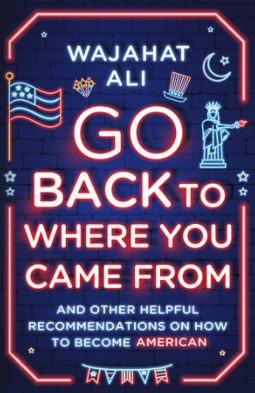I was eating tandoori chicken at Shalimar Restaurant in the Tenderloin district of San Francisco on a school night when I received a call from my aunt, Yasmeen, who said my parents had been arrested.
Earlier in the morning, a dozen armed FBI agents had raided our home in Fremont, California; dragged my parents out of bed; handcuffed them while they were in their pajamas, and drove them to the county jail in Oakland. There was even a helicopter circling our house. My father later described it as being treated like a captured drug kingpin.

My grandmothers were there, and begged the FBI agents in their broken English to at least explain why they were being taken. They didn’t receive an answer. My aunt deemed it best if I, the only child, drove down and figured out what the hell was happening.
It was April 2002 and I was about to graduate from UC Berkeley and head to law school. My biggest decision was choosing between UC Davis and UC Hastings. My “model minority” narrative and sheltered life, disrupted by the 9/11 terrorist attacks a few months prior, had been permanently reconfigured.
My parents had been caught up in Operation Cyberstorm, which at the time was the largest anti-piracy sweep in the FBI’s history. Robert Mueller, then the director of the FBI, even came out to San Jose for a press conference. It was a two-year undercover operation with more than two dozen arrests. The majority of the people arrested were alleged to be part of a highly organized criminal conspiracy involving the sale and distribution of counterfeit and infringing software.
My parents, who had owned a software-resale business, had nothing to do with the piracy ring itself. Instead, they were charged with 30 counts of conspiracy, mail fraud, wire fraud, and money laundering in what authorities described as a scheme to defraud Microsoft of millions of dollars by obtaining discounted academic software under false pretenses.
[Read: When crime is a family affair]
Microsoft initially alleged that it lost as much as $100 million, and the local newspaper ran with that number. Overnight, everyone heard that my parents had been scooped up in a massive anti-piracy raid. Their faces were plastered on the FBI website for days, and people assumed I was somehow sitting on $100 million stashed away in domestic and foreign accounts.
Oh, how I wish it were true. I really could have used that money in the weeks and months that followed.
I have no desire to relitigate my parents’ case or clear their name. That’s their story, if they choose to tell it. My take on it after all these years is that my parents made dumb and questionable business decisions, but I sincerely don’t think they were Walter White from Breaking Bad, deliberately orchestrating a criminal plot. My parents, two Pakistani American immigrants who had a beef with Microsoft, spent nearly five years in jail, but the Wall Street architects of the 2008 financial crisis that ruined so many Americans mostly got wealthier and failed upward in life.
The day after their arrest, my father was able to call me from jail. “Did you do anything shady or criminal?” I asked him. “If you did, just let me know. I have to know what I’m dealing with.” Just because they were my parents didn’t mean I was going to bury my head in the sand and make excuses for alleged criminal acts.
He assured me that he had consulted with attorneys and believed everything they had done was legit. My mother eventually called, and I asked her the same. She was just as shocked as my dad to see their names on the indictment. In hindsight, my parents should have settled the case and taken a deal. But my parents believed they were being unfairly targeted by Microsoft, and didn’t want to plead guilty to something they felt was legal.
My father told me to call and retain Chris Cannon, a lawyer whom my father had hired before and, it turned out, had read about the arrests in the newspaper. I asked Cannon if he thought my parents were innocent. He said my father was a good man but reminded him of many of his other clients, who were “aggressive businessmen,” and “that gets them into trouble sometimes.” He also asked me to send him $5,000 so he could get started on the defense.
Where would I get $5,000? How long would this last? When would my parents be released? Who was going to take care of the house, the bills, the office? By then, my parents had used the proceeds of their software-resale business to launch a dietary-supplement company. Who would pay the salaries of its employees? How was I going to study and take my upcoming finals? What about law school in the fall?
I was a 21-year-old who was supposed to focus on my education. Instead I was in Fremont, taking care of my grandmothers and trying to pay all the bills, retain and maintain legal counsel for my parents, and raise money for their bail.
The Monday morning after my parents’ arrest, I went to their office, called the six employees of the dietary-supplement business, and told them to return to work if they were comfortable doing so. I spent the next two weeks trying to learn how to run every aspect of the business.
[Read: What incarceration costs American families]
Behind the office was a warehouse that received all the goods, which were mostly vitamins and health supplements, and we packed and shipped them to our customers. After my co-workers left, I would stay behind and pack some boxes as a stress-relieving activity. I called all the existing vendors and told them I was temporarily filling in for my parents and would be their new contact. I had to find a way to maintain the payroll for everyone, including the employees in Karachi, Pakistan, who were doing all the technical work on the back end. Every employee knew that my parents had been arrested but the business was still running, so most decided to stay on.
Thankfully, my parents had previously added me to their bank account. I could access the money, except we only had enough to last us about three months. While at the office, I had to field multiple panicked phone calls throughout the day. My father would call, and I’d have to calm him down, get information and instructions from him about finances, the business, and his lawyer, and relay information to him, and as soon as I had spent 30 minutes doing that, my mother would call and I’d have to repeat the process. I also had to calm my mother’s family in Pakistan, who were, naturally, terrified about their daughter being stuck in prison. I also had to take care of my two elderly grandmothers at home.
It was the only time in my life I wished I had siblings, so I could outsource some of the work and be more efficient.
As we lost everything, I felt a sense of comfort in realizing that I didn’t miss any of it. What punctured me instead was how so many lifelong friends and community members simply abandoned us overnight, and how some were outright gleeful at our misery. Someone brought several copies of the newspaper article announcing my parents’ arrest and placed them at every mosque in Fremont and Milpitas. An old family friend at the local mosque on Fremont Boulevard came early to Friday prayers and saw them outside. He was kind enough to throw them away before the congregation came.
The collateral damage of the 9/11 attacks loomed large, reaching all the way to the Bay Area. There was a chilling effect on Muslims, especially those from Black and brown communities. Rumors spread that the FBI had parked cars outside our home and were taking down license-plate numbers and following anyone who visited us. At a pretrial hearing, the government’s attorney seized on the anti-Muslim hysteria of the moment and tried to get bail denied by mentioning that the FBI had found “documents in Arabic” in our home. Thankfully, the judge cut him off. Some of those documents were Islamic prayers from the Quran; others were religious texts in Urdu, a language entirely separate from Arabic.
Because the government had claimed our properties, I was unable to post bail for my parents. Initially, only two close family friends—whom I knew as Shaheen Aunty and Syed Uncle—were willing to step up and risk their property as collateral for my parents’ bond. They were the exception. I heard that others were whispering about my parents: “They’re just going to flee to Pakistan. Don’t help.” I tried telling people that my parents had gone to Pakistan and come back several times. They had a home, a family, and a community here, and they were willing to fight this case for years if necessary. Still, perceptions make truth, and those were heavily skewed against my parents.
Many times, I thought I’d persuaded a family member or friend to offer property as bond collateral, and then they’d balk the day before the hearing. I had to tell my parents the horrible news and listen to them deflate over the phone.
[Read: Why children with parents in prison are especially burdened]
One of my grandmothers and my aunt Yasmeen spent their time going through every single contact they had, calling and asking for help. They were like stockbrokers or sports agents trying to represent a hopeless investment. Working the phones was an utterly humiliating exercise; I sensed that some people who took my calls were simply trying to acquire gossip or indulge their appetite for drama. But desperate times called for masochistic measures.
We were running dry, and even though some family and friends loaned and gave us money, it wasn’t enough to cover the mounting expenses and debt. I extended my line of credit and assumed that the business would somehow survive and I’d be able to pay it off, but I went from having no debt to owing $50,000.
To have some cash on hand, I sold as many of our goods as I could in weekly garage sales. I also had an impressive collection of laser discs and CDs that I was able to sell on Craigslist and eBay. (My childhood wasted on movies came in handy for once!) For our first garage sale, everything we had to offer we showcased outside on the driveway, in the garage, and even inside the house. Almost everything was for sale. If someone had offered me money for a used bar of soap in the kitchen, I would have said, “Thank you! Here’s your soap, and come again!” I made posters and put them on street signs, telephone poles, and trees.
A crisis also invites people, especially strangers, to be kind and forgiving. A few weeks after my parents were arrested, an acquaintance who attended our family’s religious events got up in the middle of the night and blurted out, “We have to help them.” She woke up her husband, and told him she’d had a dream that inspired her to help our family. Coincidentally, he told her he had just had a similar dream. Over the years, they offered comfort, food, prayers, and a kind shoulder. They weren’t the only ones. After overcoming their initial hesitation and fear, some family and friends stepped up. A few community members, Muslims we had never met, offered to help just out of sympathy, or perhaps pity.
Every little piece of support helped me find a way to get my parents out of jail. My mother’s eldest brother, Masood Mamoo, asked a wealthy friend from college to put up a property as collateral for bond. Based on my uncle’s word, a random man whom I’d never met came through. My uncle Shahed—who is actually my father’s first cousin—was successful in real estate at the time, and he put up a property as well. We were able to eventually rally family members and a couple of family friends as signatories who vouched for my parents, and all of that was finally enough for the judge to grant them bail. I posted the bond nearly a year after my parents’ arrest.
My parents were able to leave prison and breathe freely. For several weeks, they lived in a halfway house in Oakland. I drove there every day to pick them up and then dropped them off before curfew in the evening. They had to reenter a life that had been completely shattered.
Throughout my 20s, the sword of Damocles hung over our heads. At any moment my parents could lose their appeal and immediately be whisked to jail for several years, and I would be stuck, again, taking care of their mess. My mom says she still tells everyone, “Wajahat is our Rock of Gibraltar.” At some moments over the years, my parents have been apologetic. It’s clear they have understood that our family’s experience harmed me. Yet, to my eyes, they remained incapable of recognizing the immense, oppressive weight of it all—the heavy burden of carrying the Ali baggage. Often, the most important words we need to hear remain unspoken.
This piece is excerpted from Wajahat Ali’s recent book, Go Back to Where You Came from: And Other Helpful Recommendations on How to Become American.



